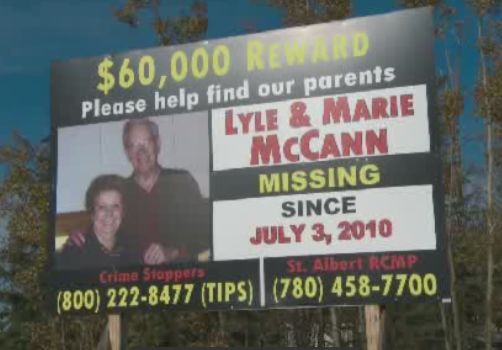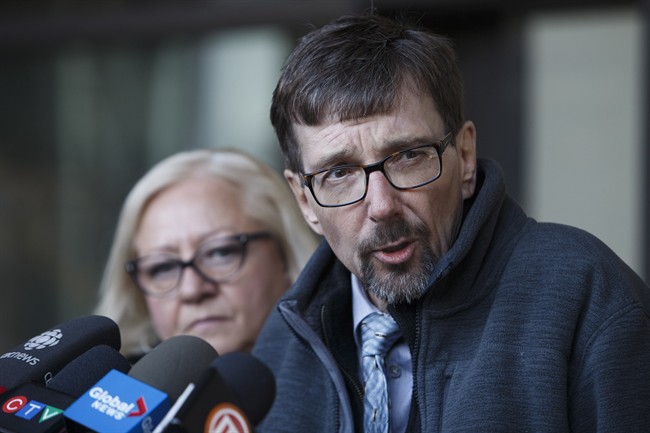The Supreme Court of Canada says it will not hear an appeal from the Alberta man convicted of killing two seniors who disappeared on a camping trip in 2010.

Travis Vader was sentenced to life in prison for the deaths of Lyle and Marie McCann. On Thursday, the high court dismissed his request to hear his bid for a new trial. As usual, the Supreme Court gave no reasons for refusing to hear Vader’s arguments.
The couple’s son Bret McCann said the result is terrific news and hopes Vader will finally say what happened.
“He really needs to accept his sentence, the verdict. He’s never acknowledged guilt. What he needs to really do is disclose what he’s done with my parents’ remains,” McCann said on the phone from his home in Melbourne, Australia. He set his alarm to get up in middle of the night in order to hear the news.
The couple, in their 70s, vanished after leaving their home in St. Albert, a bedroom community directly north of Edmonton, in July 2010.
They were headed on a road trip to British Columbia, and had planned to meet up with family.
Their burned-out motorhome and a vehicle they had been towing were discovered days later near Edson, about 200 kilometres west of the city.
Their bodies have never been found and it’s not known how the couple was killed.
“It’s something that is just an ongoing pain. Closure is a difficult word, but we really want to know what happened,” McCann said.
“Until we know where their bodies are and what he… what really happened that day, it will be a pain forever.”
For years, the McCann family paid to have highway billboards put up asking for information that could help find them.
“It’s always the first topic of conversation,” said Bret McCann.

Get daily National news
“Last summer we spent a day with my aunt in Edmonton and my uncle came over as well and we spent the whole afternoon talking about it. It’s 10 years ago, but it’s topmost in my aunts’ and uncles’ minds, and I think about it all the time.”

A trial judge determined Vader was a desperate drug addict who came across the McCanns and killed them during a robbery.
If Vader’s trial had been a TV legal drama, its twists and turns would have consumed an entire season.
Shortly after the McCanns’ SUV was found, Vader was declared a person of interest and arrested on unrelated charges. He was eventually sentenced to nearly three years for arson and break-and-enters.
In 2012, he was charged with first-degree murder in the McCann case. Shortly after, he was convicted of earlier drug, theft and weapons offences.
- Son of Norway’s crown princess arrested before his trial on rape, other charges
- RCMP misconduct cases grew in 2024, dismissals increased 5-fold: report
- Two teens arrested in connection with First Nation double homicide in northern Quebec
- Unsealed court records allege Quebec militia plot to seize cottages by force
READ MORE: A look back at the case against Travis Vader ahead of verdict
But before he was sentenced on those charges, a mistrial was declared. Vader filed a lawsuit that claimed RCMP and justice officials had trumped up charges against him so they could keep him in jail until murder charges could be laid.
Two years later, the murder charges were stayed just days before trial was to begin. Mounties had failed to disclose evidence to Vader’s lawyers. Vader filed another lawsuit.
In the fall of 2014, Vader was found not guilty after a second trial on the drug charges. He was released for the first time in four years, but was rearrested within weeks in the McCann case.
The trial finally began in March 2016.
Justice Denny Thomas convicted Vader of second-degree murder, but later substituted the verdict with manslaughter, because he had mistakenly used an outdated section of the Criminal Code. Portions of Section 230 were ruled unconstitutional more than 25 years ago.

Lawyers for Vader asked the Alberta Court of Appeal for a new trial or for his manslaughter charges to be stayed because of the judge’s mistake.
The lawyers said the judge made errors and showed bias when he substituted the lesser offence.
They also argued that the RCMP was negligent in handling disclosure at trial, which added two years of delay.
The Crown told court there were exceptional circumstances that justified the time it took to complete the trial.
The Appeal Court unanimously dismissed the appeal in May.

READ MORE: Travis Vader gets life sentence for killing Lyle and Marie McCann
Vader still has one court date. McCann said a separate appeal process, related to Vader’s life sentence, is scheduled to be heard next week in the Alberta Court of Appeal.
“I’m hoping that a similar result will occur,” he said.
Defence attorney Brian Beresh said he will be seeking a 10-year sentence for his client.
“He received the most harsh penalty you could for manslaughter, that we believe in law that that’s reserved for the worst person in the worst scenerio. This isn’t that case,” Beresh said.
READ MORE: The McCann murders and other cases without bodies
McCann said he has been told Vader can apply for parole soon. “I know that next spring he’s eligible to apply for parole, which is kind of shocking in itself,” he said.
McCann said he hopes the parole board will take into account the fact Vader has never disclosed what happened to the McCanns’ bodies or accepted responsibility.
“He’s never admitted guilt. He’s never expressed remorse.”
“All of these considerations should mitigate against his release — I suggest that no rehabilitation has taken place and he would continue to be a danger to the public,” McCann said.

In March 2019, Conservative Sturgeon River-Parkland MP Dane Lloyd introduced Private Member’s Bill C-437 — “An Act to amend the Criminal Code, the Corrections and Conditional Release Act and the Prisons and Reformatories Act.”
The bill, also called McCanns’ Law, aims to add, as an aggravating factor for sentencing purposes and as a reason to delay parole, the fact that a killer refuses to provide the location of bodies or remains.
The bill is similar to the “No Body No Parole” law in Australia and “Helen’s Law” in England and Wales, which force killers to reveal the location of their victim’s body if they want parole.
McCanns’ Law was introduced and passed first reading in the House of Commons last spring, however it did not go further before Parliament was dissolved when the election writ was dropped in September.
— With files from Bob Weber, The Canadian Press










Comments